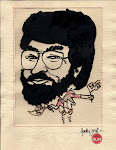The news that a woman who was trapped for eight days in her car at the bottom of a ravine in Seattle was found because of the crackling sound of her dying cell phone serves as a poignant reminder of the paradox of cell phone use. In telling the story in the Globe and Mail on September 28th, Rod Mickleburgh wrote that, although the battery on Tanya Rider's cell phone eventually died out, a steady ping from the phone had registered at the nearest communications tower. After obtaining the woman's cell phone records, police managed to identify the tower and guessed she was within an eight-kilometre radius.
I own a cell phone. But, in many ways, I hate cell phones. Yes, I realize that "hate" is a pretty strong word. But I feel strongly about the way that cell phone use is abused (another strong word).
I hate the way that they keep strangers from interacting with each other. I hate the way they steal parents away from focusing on their children. I hate the way they detract from friends focusing on friends in a restaurant or as they walk down a sidewalk. I hate the way they interrupt a moment of relative calm when I am sitting in an airport waiting area or walking in a park. I hate the way they keep people from having to sit and think and reflect on life and their lives. And I hate the way they want to track me down when I simply want to be left alone – to focus on my five-year-old daughter, visit with a friend, relax in the airport or park, and think about life and people.
That's why I seldom use mine, except, pretty much, for emergencies and necessary contact, along with the occasional impromptu photo.
As I have emphasized in The Boomer Factor, "Technology, as always, is not the enemy. But clearly it always needs to serve us rather than the other way around. We have to determine our needs and wants and values, and draw on technology accordingly" (88). I remind readers of sociologist William Ogburn's important observation that cultural norms do not move quickly enough to keep up with technological developments; norms that are we need in order to make optimum use of technological innovations literally "lag" behind.
When it comes to balancing cell phone use with good interpersonal life, we are lagging behind, mightily. That said, "the cell" is obviously a wonderful communication addition, particularly in its expanding multi-functional forms. At its best, it brings us together; at its worst, it keeps us apart.
What we need to do, collectively and individually, is figure out how to use the dang thing!
Saturday, September 29, 2007
Subscribe to:
Posts (Atom)


